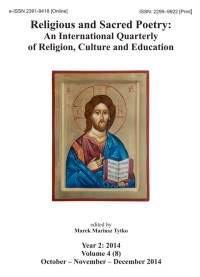Избранные вопросы перевода поэзии Марека Мариуша Тытко на русский язык (на материале сборника «Встреча с Иным»)
Selected Problems of the Translation of Marek Mariusz Tytko’s Poetry into the Russian Language ("Meeting with the Other")
Author(s): Michal JankowiczPublished by: Fundacja Naukowa Katolików »Eschaton«
Keywords: eschathological poetry; Russian language; poetry translation; translation transformation; Marek Mariusz Tytko (1967- ); Oleksandr Gordon (1961- )
Summary/Abstract: The aim of this article is to identify and describe the problems of translation from Polish into Russian of Marek Mariusz Tytko’s selected poems from the volume of poetry “Spotkanie innego” [The Meeting with the Other] Olexander Gordon’s translation, not yet published, is analyzed here. Description and analysis of cross-language translation of poetry are an interesting issue, which is relatively rarely researched. The article focuses on the description of the transformation applied in Oleksander Gordon’s translation into the Russian language. Olexandr Gordon’s translation of the volume of poems “Spotkanie innego” has considerable artistic value and contributes to the popularization of eschatological poetry among Russian- speaking readers. The translator, who is also a poet, conveys the meaning and ideas of Marek Mariusz Tytko’s poems very well and makes use of the advantages presented by the Russian language to successfully transfer the content and style of this poetry into Russian and, eventually, the translated text does not introduce many changes in the range of interpretative possibilities of the original poems. Various transformations applied by translators influence the perception of the poems. The need to use the transformations is related to the differences between the systems of the Polish and Russian languages. The changes that take place during the translation process refer to the following aspects of the poetic text: stylistic colouring, semantics, grammatical features, vocabulary, syntactic structure of the text. The translation under discussion has preserved the author’s style to a considerable degree. Metaphorical statements in some cases in the course of the translation process lose some of their metaphorical meaning, acquiring a directness that is conducive to the loss of style of some fragments of the poems. However, the translator compensates the loss of style in the fragments of the translation by providing other, neighboring fragments with metaphorical meaning. So the original version and translation have identical stylistic tinge, despite the differences in particular fragments. Moreover, the translator enriches the poems stylistically (choosing another way of describing things, expressing the same meaning by other parts of speech, using his own metaphors, etc.) that becomes an added value in the translated text.
Journal: Religious and Sacred Poetry: An International Quarterly of Religion, Culture and Education
- Issue Year: 2014
- Issue No: 4
- Page Range: 193-213
- Page Count: 21

